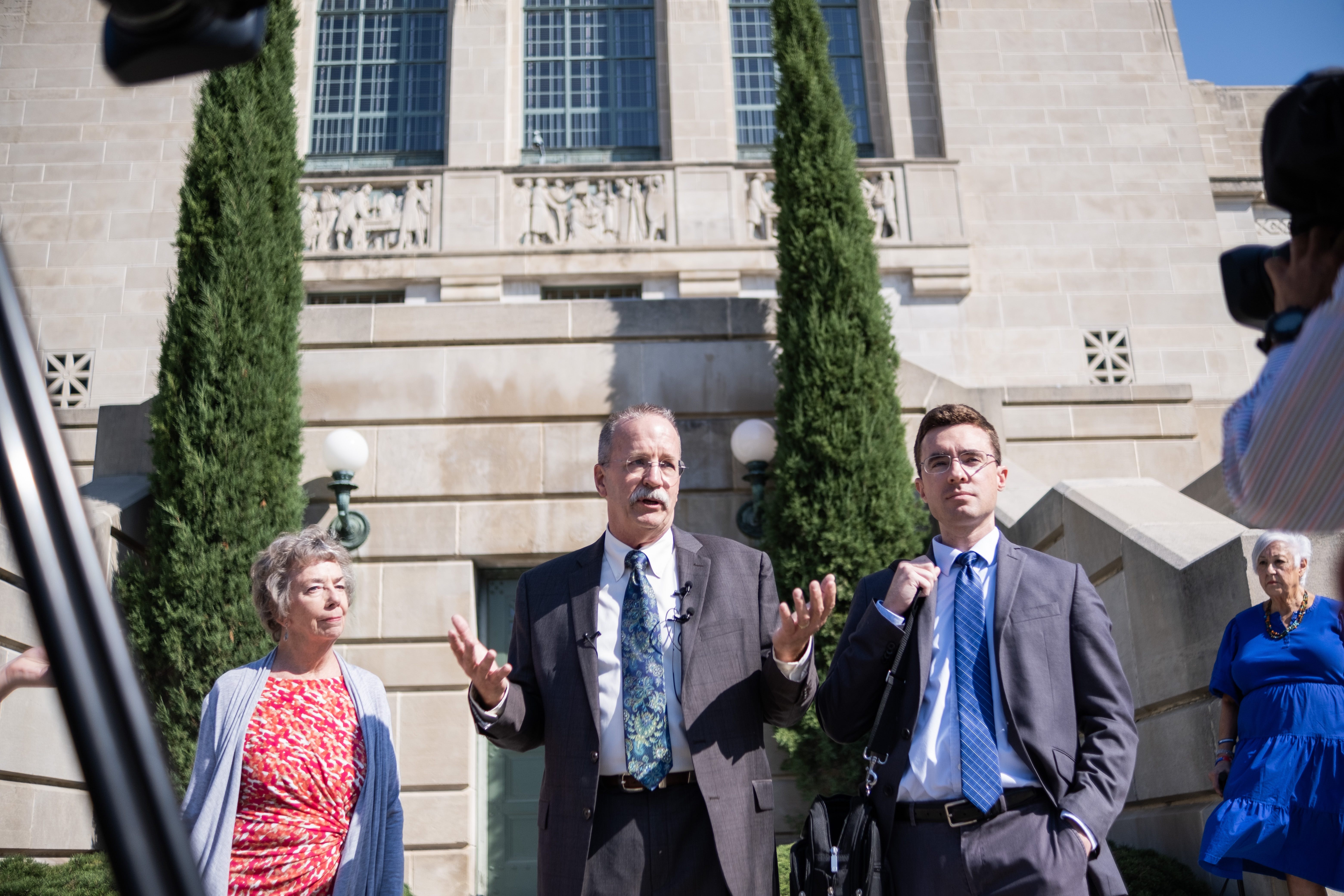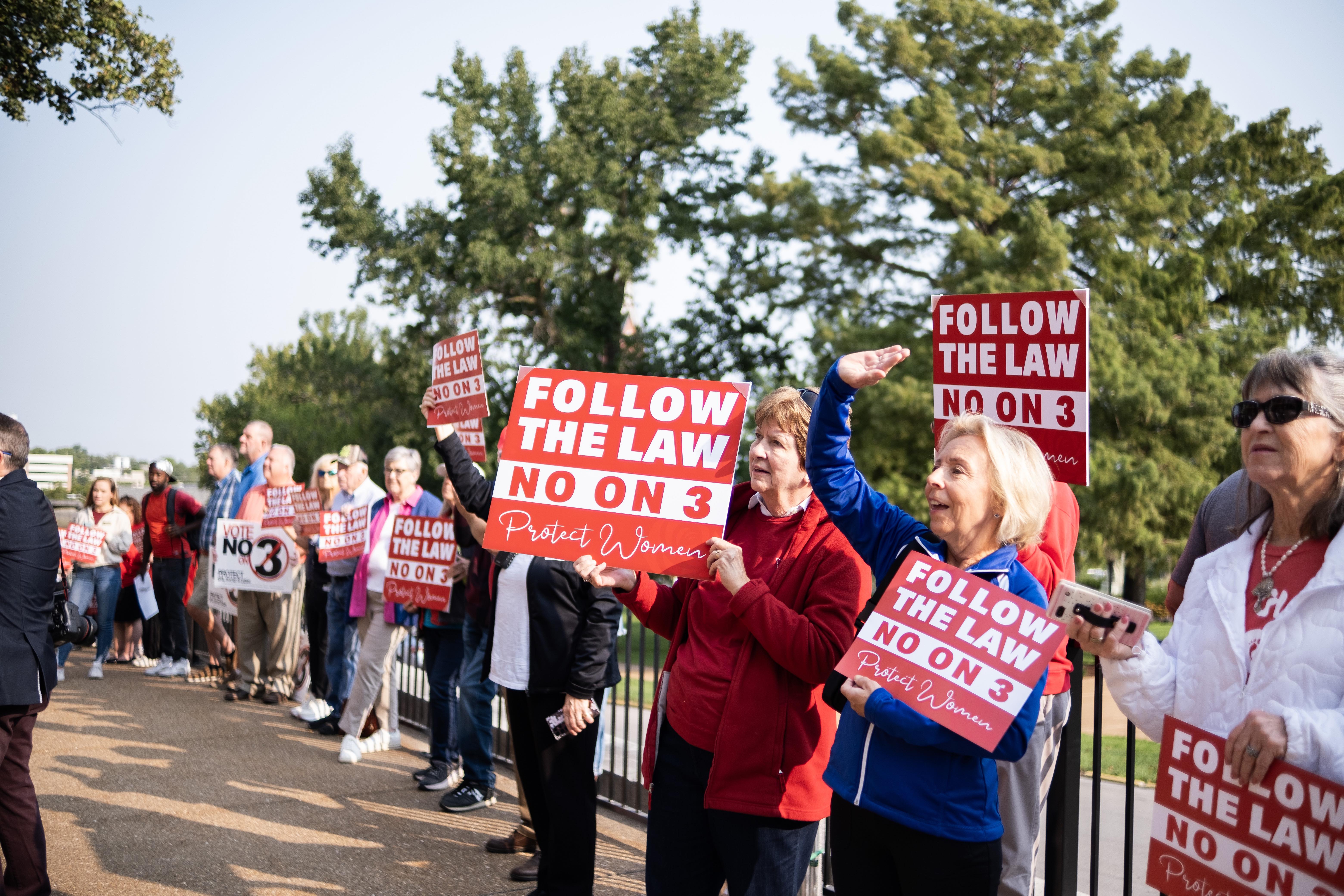Challenging Abortion on the Ballot
Fighting in state supreme courts against 2024’s pro-abortion ballot initiatives in Coleman v. Ashcroft and State of Nebraska ex rel. LaGreca v. Evnen

This article originally appeared in the Thomas More Society 2024 Impact Report. To explore the full Impact Report, click here.
On a sunny September morning in 2024, Mary Catherine Martin, Senior Counsel at Thomas More Society, walked out of the Missouri Supreme Court in Jefferson City and onto the courthouse steps as the press flocked around her. The air was electric with anticipation. Only hours remained as the deadline to print Missouri’s 2024 general election ballots loomed—only hours until the court would have to return a decision on the argument completed just minutes before Martin stepped onto the steps.
Inside, she had just delivered oral arguments before the court, representing a coalition of Missouri lawmakers and pro-life activists determined to stop Amendment 3, a ballot initiative deceptively—and ideologically—framed as the “Right to Reproductive Freedom Initiative.” It was a fight not just for Missouri’s pro-life laws but for the truth about what the initiative truly meant for the state and its voters.
MISLEADING MISSOURIANS
Amendment 3, backed by well-funded pro-abortion groups like Planned Parenthood and the ACLU, promised Missourians a constitutional right to “reproductive freedom,” effectively without limits. Beneath its polished rhetoric, aimed to mislead Missourians, the initiative concealed a radical agenda: to dismantle decades of pro-life protections, including bans on late-term abortions, parental consent laws, and restrictions on abortions based on race, sex, or Down syndrome diagnoses. Moreover, the initiative opened the door to a right to gender transition and transgender access to bathrooms and locker rooms—all of which arguably fell under the ballot initiative’s almost infinitely broad “all matters relating to reproductive freedom.”
Martin, along with Tim Belz, TMS Special Counsel, had dedicated countless sleepless hours in the weeks leading up to the hearing, crafting a case to remove Amendment 3’s deceptive language from the 2024 ballot. The battle began in earnest when TMS filed a lawsuit in Cole County, Missouri, challenging the initiative’s petition for failing to comply with state law. Missouri requires ballot initiatives to explicitly list any statutes or constitutional provisions that would be repealed if the measure passes. The coalition behind Amendment 3, Missourians for Constitutional Freedom, had sidestepped this requirement, leaving voters in the dark about the sweeping changes the amendment would unleash.

Just days before the Missouri Supreme Court hearing, Cole County Circuit Judge Christopher Limbaugh delivered a bombshell ruling on September 6, 2024, after a bench trial on the ballot measure: the petition was in “blatant violation” of state law for failing to disclose the laws it would nullify. That decision could mean Amendment 3 had to be taken off the November ballot—a victory that sent shockwaves through the media and the pro-abortion initiative’s campaign.
But the fight was far from over. The pro-abortion campaign appealed, and the case escalated on an expedited track to the Missouri Supreme Court. Martin, alongside her clients in the lawsuit against Amendment 3—pro-life lawmakers Sen. Mary Elizabeth Coleman and Rep. Hannah Kelly, along with pro-life advocate Kathleen Forck and Our Lady’s Inn President Peggy Forrest—argued that the initiative’s vague language and omissions were a deliberate attempt to mislead voters.
As night fell that day and the ballot printing deadline loomed, the court returned a decision—on a razor-thin 4-3 split, revealed later in a clarifying opinion. The majority reversed Judge Limbaugh’s ruling, allowing Amendment 3 to appear on the ballot. TMS’s challenge had been unsuccessful, but not without a cost to the opposition. The legal battle had thrust the initiative’s flaws into the public eye, sparking widespread media coverage across outlets like The New York Times, Associated Press, The Washington Post, and Missouri Independent—finally giving prominence to the pro-life argument against the initiative.
As Missourians prepared to vote, litigation by TMS attorneys ensured that the conversation was no longer one-sided in favor of the ACLU and Planned Parenthood. News reports and public debates highlighted the initiative’s failure to disclose its full impact—as revealed by the lawsuit— from potentially allowing late-term abortions, undermining parental rights, enshrining gender ideology, and eroding the safety of women and girls. The public now knew the truth: Amendment 3 was about far more than only allowing abortion in Missouri. Though Amendment 3 narrowly passed with 52% of the vote, the scrutiny generated by the lawsuit forced its supporters to defend their deceptive tactics, revealing the truth to many voters who may never have encountered it otherwise.
CORNHUSKERS’ ‘TROJAN HORSE’
At the same time, another battle was brewing in Nebraska, where TMS attorneys were simultaneously challenging a similar pro-abortion ballot initiative. The day before
Senior Counsel Matt Heffron and Michael McHale speak to press fol lowing a hearing at the Nebraska Supreme Court.
Martin’s Missouri Supreme Court argument, Matt Heffron, TMS Senior Counsel, stood before the Nebraska Supreme Court in Lincoln. There, he delivered a compelling oral argument with the support of TMS Senior Counsel Michael McHale. Their arguments echoed the same theme as in Missouri: deception in the name of “reproductive freedom.”
Nebraska’s so-called “Protect Our Rights” initiative, like Missouri’s Amendment 3, sought to enshrine abortion rights in the state constitution up to viability and beyond, with broad exceptions that opened the door to unlimited abortion. But it faced a unique complication: a competing pro-life ballot measure, aimed to give voters the choice to protect life and leave in place Nebraska’s pro-life law.
The Nebraska challenge, spearheaded by Heffron and McHale, centered on the initiative’s violation of the state’s “single-subject rule,” which requires ballot measures to address only one issue. TMS argued that the Protect Our Rights initiative was a “Trojan horse,” lifting restrictions on both early- and late-term abortion—two separate issues in Nebraska law. The lawsuit challenging the initiative, filed on behalf of pro-life advocate Carolyn LaGreca, meticulously dissected the initiative’s language, warning that it would gut Nebraska’s existing 12-week pro-life law and completely eliminate regulation of abortion by the state, opening the door to unrestricted abortion. The oral argument was a high-stakes moment, with Heffron facing tough questions from the justices about the balance between voter choice and constitutional clarity. “If passed, this would be a sea change, overturning nearly 50 years of Nebraska laws on abortion,” Heffron stated.
Days later, the Nebraska Supreme Court ruled to allow both the pro-abortion and pro-life initiatives to remain on the November ballot. The legal fight had achieved something critical: it amplified the pro-life message in a way that resonated with voters. Through TMS efforts, coupled with grassroots campaigns, unprecedented attention was brought to the radical scope of the pro-abortion initiative and its effects, while renewing focus on the pro-life alternative, known as the Protect Women and Children initiative. Media outlets, from local papers like the Nebraska Examiner to national platforms NBC and Associated Press, covered the dueling measures with bated breath—giving mainstream airtime to pro-life arguments in Nebraska for the first time in the run-up to the election.
SHAPING PUBLIC OPINION
When Nebraskans went to the polls on November 5, 2024, the results were a testament to the lawsuit’s impact on public perception of the pro-abortion ballot measure. The Protect Our Rights initiative was rejected, while the pro-life Protect Women and Children measure passed, affirming constitutional protections for life and avoiding the radical abortion deregulation the competing initiative would have wrought.

In both Missouri and Nebraska, TMS fought against overwhelming odds—well-funded opponents, sympathetic media, and a cultural tide favoring abortion rights. Yet, even in defeat, these challenges reshaped the public narrative. In Missouri, the 4-3 Supreme Court decision and the ensuing media storm ensured that voters understood the stakes, even if the initiative passed. In Nebraska, TMS efforts played a role in securing a rare pro-life victory in a post-Roe landscape, demonstrating that the power of court battles lies not only in delivering justice but also in shaping public opinion.
These challenges to the pro-abortion referenda gave a platform to speak truth to power. Across both states, millions of voters heard the message that these ballot initiatives were not about freedom but about eroding protections for the most vulnerable. The media attention—spanning not only conservative outlets but far and wide across mainstream news—ensured that the public could no longer ignore the fine print on Missouri’s and Nebraska’s ballot measures and set the stage for future legal and political battles concerning life on the ballot.







